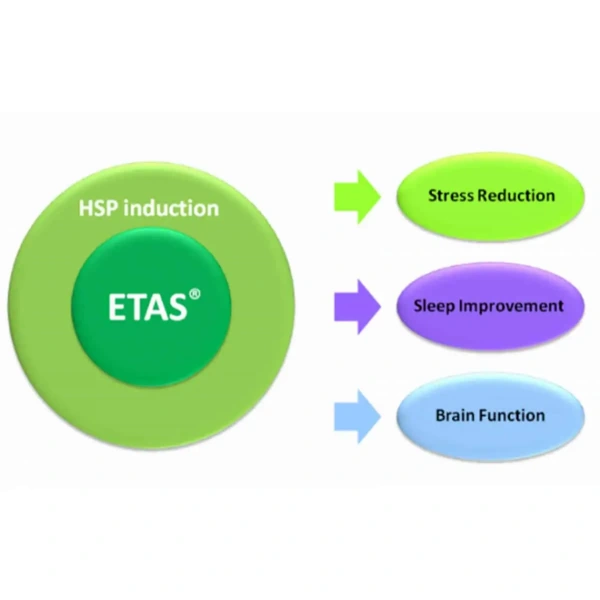- For the home
Health
- Bones and Joints
- Digestion and Healthy GI
- Essential Oils
- Fish Oil / Omega-3
- Healthy Sleep
- Heart and Cardiovascular System
- Immunity
- Liver
- MCT Oil
- Men
- Mind and Focus
- Minerals
- Pet Supplements
- Pro-Health Supplements
- Probiotics
- Senior
- Superfoods
- Urinary Tract
- Vitamins
- Vitamins for hair
- Vitamins for nails
- Vitamins for the skin
- Weight Management
- Woman
Healthy Diet
Herbs
Mother and Baby
Sport
Your Goal
Pet Supplements
Cosmetics
- Cosmetics for children
- Men's Cosmetics
- Unisex Cosmetics
- Women's Cosmetics
- Dezodoranty i perfumy
- Higiena jamy ustnej
- Kosmetyki akcesoria
- Kosmetyki dla dzieci2
- Kosmetyki do ciała
- Kosmetyki do higieny intymnej
- Kosmetyki do opalania
- Kosmetyki do pielęgnacji ust
- Kosmetyki do twarzy
- Kosmetyki do włosów
- Papier toaletowy / chusteczki
Dr. OHHIRA ETAS (Stress Reduction, Sleep Support) 60 Capsules
Available: 0 szt.
42,20 €
Price per portion: 2,11 €
Temporarily unavailable
After purchase you will receive 173 pts
Product Details
- Description
- Dosage
- Ingredients Table
- About the brand
- Nutritional information
- Reviews (1)
- Articles
ETAS® is a patented, enzymatically processed asparagus root extract with stress-reducing and sleep-promoting properties.
- prevents you from waking up early
- reducing the number of dreams
- sleep time optimization
- decrease in cortisol secretion
- decrease in the concentration of Chromogranin A in saliva
- increase in the concentration of IgA in saliva
- improving the balance of the functioning of the anatomical nervous system
- supports the development of neurons
- reduction of neuronal damage (Aß, SNP, CoCI2)
- animal model | memory improvement in age-related cognitive disorders
- reducing the tendency to fall into depression and depression (POMS test)
- increase in the number of correct answers in calculation (evaluation) tests
ETAS The world's first supplement to induce the production of heat shock protein. optimizes the length of sleep and its quality, and prevents early awakening. reduces the impact of stress on the body and reduces the secretion of cortisol It supports cognitive functions, improves mood and memory. Supports the development of neurons. Observations show that sleep improvement occurs after 10 days of use, and depression / fatigue and mood improve after approx. 3 weeks.
A plant extract with a proprietary production process, made from the bottom end of asparagus (Asparagus officinalis) with stress-reducing and sleep-promoting properties. It is the first extract in the world whose mechanism of action is to trigger the release of the heat shock protein HSP70 (Heat Shock Protein 70), usually produced by the body in response to exposure to excessive heat. This effect is similar to that of a hot spring bath or a sauna, which delays the aging process and relieves stress.
ETAS® is a patented, enzymatically processed asparagus root extract with stress-reducing and sleep-promoting properties. It is the first extract in the world whose mechanism of action is to trigger the release of the heat shock protein HSP70 (Heat Shock Protein 70), usually produced by the body in response to stress related to exposure to excessive heat. This effect is similar to that of a hot spring bath, which delays the aging process and relieves stress. ETAS® has other beneficial effects, such as improving heart rate variability, improving cognitive abilities and reducing fatigue. ETAS® is rich in compounds known as hydroxymethylfurfural derivatives that have been identified as novel compounds capable of inducing HSP70 expression (Ito, 2013). One such compound contained in ETAS® is the derivative known as asphural (5-hydroxymethyl-2-furfural derivative - HMF-1). It exhibits significant activity in increasing the expression of HSP70 mRNA, as well as a number of biological activities, including antioxidant activity, reducing myocardial ischemia and improving blood flow (Ito, 2013).
Product made from asparagus
The soft buds of asparagus are healthy and nutritious food, often used in the preparation of gourmet meals, while the woody parts of the stem are usually thrown away. Scientists in Japan have found that when properly processed with enzymes and extracted elements of the ejected part of the rhizome, it exhibits remarkable health properties.
Lowering the parameters of stress
Heat shock proteins (HSPs) are intracellular proteins produced by various stress factors, mainly as a result of overexposure to heat. They help to protect and repair the body's cellular proteins from thermal damage, preventing them from deforming and denaturing, as a result of which they would no longer function as usual. It is hypothesized that these proteins are responsible for the anti-stress and anti-aging effects of thermal and spa treatments. The formation of heat shock proteins is also stimulated by exercise and calorie restriction, which is known from animal studies to increase life expectancy (Iguchi, 2012, Calderwood, 2009). Certain HSP proteins (HSP70) directly protect cells from damage that could lead to an earlier cell death known as apoptosis. However, the response to heat shock decreases with age, and the attenuation of the response contributes to aging, allowing the development of diseases that cause protein aggregation (eg Alzheimer's disease). This in turn leads to a decrease in cell viability and a decrease in longevity (Calderwood, 2009).
Dosage
Serving Size: 3 x 1 Caopsule
Servings per Container: 20
Form: Capsule
Other ingredients
Discover Dr. Ohhira: Embrace Japanese Wellness
Dr. Ohhira, the Japanese microbiologist, unraveled the secret of longevity and captured it in vials. These supplements, born from nature's gifts, promote well-being and radiance.
Dr. Ohhira® supplements embody Japanese excellence, combatting aging at its core. With a reputation for precision and quality, this brand harmonizes ancient wisdom with modern science.
Their unique compositions feature probiotics, prebiotics, collagen, and natural nourishing elements. Crafted for efficacy and wellness, we invite you to embrace the essence of Japanese well-being.
It cannot be used as a substitute or substitute for a varied diet.
The product should not be administered to pregnant women and nursing mothers.
Do not exceed the recommended daily intake.
Keep out of the reach of children.
Packaged by weight not by volume.
Store in a cool, dry place.
Best before end: date on the package.
Descriptions are the property of the store www.mass-zone.eu. Copying and distributing the descriptions is prohibited!
In accordance with the Act of February 4, 1994 on copyright and related rights (Journal of Laws of 2006, No. 90, item 631, as amended)
Producer: Dr.OHHIRA® ul. Włodarzewska 55F/L3, 02-384 Warszawa
Zalecił mi dietetyk i jestem bardzo zadowolona. Zdecydowanie zauważyłam lepsza jakość snu i łatwiejsze zasypianie
We make every effort to ensure that reviews come from customers who have used or purchased the product. Reviews are collected, verified, and published according to the rules described in the store's terms and conditions.



























